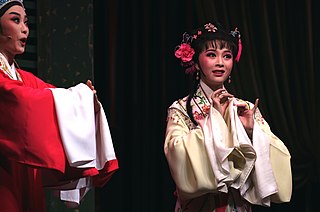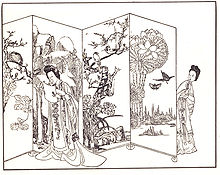
Hua Mulan is a legendary Chinese warrior from the Northern and Southern dynasties period (420–589) of Chinese history, originally described in the Ballad of Mulan. In the ballad, Hua Mulan, disguised as a man, takes her aged father's place in the army. Mulan fought for twelve years and gained high merit, but she refused any reward and retired to her hometown.
The history of Chinese literature extends thousands of years, from the earliest recorded dynastic court archives to the mature vernacular fiction novels that arose during the Ming dynasty to entertain the masses of literate Chinese. The introduction of widespread woodblock printing during the Tang dynasty (618–907) and the invention of movable type printing by Bi Sheng (990–1051) during the Song dynasty (960–1279) rapidly spread written knowledge throughout China. In more modern times, the author Lu Xun (1881–1936) is considered the founder of baihua literature in China.

Dou E Yuan, commonly translated as The Injustice to Dou E, and also known as Snow in Midsummer, is a Chinese play written by Guan Hanqing during the Yuan dynasty. The full Chinese title of the play is Gan Tian Dong Di Dou E Yuan, which roughly translates to The Injustice to Dou E that Touched Heaven and Earth. The story follows a child bride turned widow, Dou E, who is wrongly convicted of crimes by a corrupt court official for actions perpetrated by a rejected suitor, Mule Zhang. After her execution, three prophesied phenomena occur to prove her innocence, including blood raining from the sky, snow in June and a three-year drought. After a visit from the ghost of Dou E, her father eventually brings the corrupt court official, a doctor and Mule Zhang to justice, thereby vindicating his daughter. Today, the phrase "snowing in June" is still widely used among Chinese speakers as a metaphor for a miscarriage of justice. The story was repeatedly used and modified by later dramatists and remains one of Guan's most popular works.

Kunqu, also known as Kunju (崑劇), Kun opera or Kunqu Opera, is one of the oldest extant forms of Chinese opera. It evolved from the Kunshan melody, and dominated Chinese theatre from the 16th to the 18th centuries. The style originated in the Wu cultural area. It is listed as one of the Masterpieces of the Oral and Intangible Heritage of Humanity by UNESCO since 2001.
Stephen H. West, Ph.D is a sinologist, philologist, and translator.
Wang Shifu, courtesy name of Wang Dexin (1250-1337?), was a successful Chinese playwright of the Yuan Dynasty. He was born in Dadu, the capital of the Mongol-Yuan Dynasty.
Wei Chengqing (韋承慶) (640?–706?), courtesy name Yanxiu (延休), formally Viscount Wen of Fuyang (扶陽溫子), was an official of the Chinese dynasty Tang Dynasty and Wu Zetian's Zhou Dynasty, serving as a chancellor during Wu Zetian's reign.

Romance of the Western Chamber, also known as Way Down West, is a 1927 silent Chinese film drama directed by Hou Yao.

All Men Are Brothers is a Chinese television series adapted from Shi Nai'an's Water Margin, one of the Four Great Classical Novels of Chinese literature. The series is directed by Kuk Kwok-leung and features cast members from mainland China, Taiwan and Hong Kong. The series was first broadcast on 8TV in March 2011 in Malaysia.

Lady Wu: The First Empress, also known as The Great Empress or Empress Wu Meiniang, is a 2003 Chinese television series based on the biography of Wu Zetian, the only woman in Chinese history to assume the title of Empress Regnant. The series was first broadcast on CTS in Taiwan in 2003 under the Chinese title 武媚娘傳奇.
The Biography of Ying-ying, also translated as the Story of Yingying, by Yuan Zhen, is Tang dynasty chuanqi story. It tells the story of a relationship conflicted between love and duty between a 16-year-old girl and a 21-year-old student. It is considered to be one of the first works of fiction in Chinese literature.
Vincenz Maria Hermann Hundhausen was a German who was a German-language professor at Peking University and a translator of Chinese works into German. He used the Chinese name Hong Taosheng.

Cui Yingying is a fictional character from "Yingying's Biography", a Chinese story by Yuan Zhen (779–831), and Romance of the Western Chamber, a Chinese play by Wang Shifu (1250–1337?).
Masaru Aoki was a Japanese Sinologist.

A Brief History of Chinese Fiction is a book written by Lu Xun as a survey of traditional Chinese fiction. It was first published in Chinese in 1930, translated into Japanese, Korean, German, and then into English in 1959 by Gladys Yang and Yang Xianyi. It was the first survey of Chinese fiction to be published in China, and has been influential in shaping later scholarship.

Love Family is a 2013 till 2014 Taiwanese romance, family, comedy television series produced by Sanlih E-Television. Starring Chris Wang and Serena Fang as the main leads, with Jack Lee and Amanda Chou as the main supporting leads. The Chinese title literally translates to "A Loving Family", which is in reference to the main female lead's character family. Filming took place from October 9, 2013 till January 29, 2014 and was filmed as the drama aired. First original broadcast began October 29, 2013 on SETTV channel airing weekly from Monday till Friday at 8:00-9:00 pm. Final episode aired on February 10, 2014 with 72 episodes total.

Love Cuisine is a 2015 Taiwanese romance, comedy drama television series produced by Sanlih E-Television, starring Lego Lee, Allison Lin, Duncan Chow and Nita Lei as the main cast. Filming began on July 13, 2015 and will be filmed as it airs. First original broadcast began August 7, 2015 on SETTV channel airing every Friday nights at 10:00-11:30 pm.
Romance of the Western Chamber is a 2013 Chinese historical romantic comedy directed by Lu Qi and written by Chen Baohua. It stars Zhou Qiqi, Zhang Xiaochen and Deng Jiajia. The TV series is an adaptation of Wang Shifu's work of the same name.

Hongniang, or Scarlet, is a fictional character from "Yingying's Biography", a Chinese story by Yuan Zhen (779–831), and Romance of the Western Chamber, a Chinese play by Wang Shifu (1250–1337?). She is the maidservant of Cui Yingying. In Yuan Zhen's story, she doesn't play an important role, but in Wang Shifu's play, Hongniang figures prominently. Intelligent, sympathetic, loyal, and highly enthusiastic, it is Hongniang who made Cui Yingying and Scholar Zhang fall in love, and it is she who made their marriage happen. Hongniang has entered modern Chinese vocabulary as a synonym for a (female) matchmaker.




















